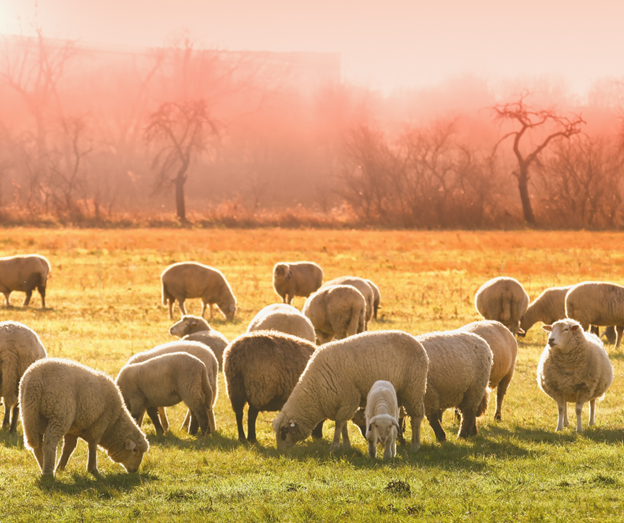Whether you’re a sheep farmer, a sheep breeder or a smallholder, protecting against the many risks they (and you) encounter is critical to your peace of mind. Australian sheep graziers must constantly manage the risks of changing global market settings and volatile domestic conditions.
The sheep business, like most agricultural enterprises, is a risky one indeed. You’ll face uncertainty about future environmental conditions, theft, fire and more. Managing risks and uncertainty is a tricky management challenge of the farm business, so let’s explore some common risks in detail and what you can do to minimise them.
Climate and weather
Aussie weather can change its temperament in two shakes of a lamb’s tail — wreaking havoc on your land and sometimes causing loss of livestock. Climate change is anticipated to increase the frequency of extreme weather events, including drought.
Sheep are also vulnerable to rain and strong winds — which often prompts a Warning Sheep Grazier Alert. July and August are the months we see most warnings to sheep graziers. Conditions such as these with rain and strong winds are a high risk for lamb and sheep losses.
What you can do to minimise risk: In the event of extreme weather, move sheep into the most sheltered paddocks with tall grasses with a tree shelterbelt or if possible, into a shed.
Make sure they have access to good quality food and that ewes in late pregnancy can graze to reduce the risk of pregnancy toxaemia. This could consist of quality hay, grain or pellets.
Livestock worrying
Sheep worrying in livestock farming is not a new challenge. But the rise in dog ownership and walks in nature with four-legged friends since the COVID-19 is making it all-too-common. The impact of sheep worrying on the farmers and livestock is stark. By chasing sheep, dogs often cause injury, suffering or abortion of pregnant ewes. For the farmer, sheep worrying takes a financial but also emotional toll and many report an effect on their mental health.
What you can do to minimise risk: Ensure that boundary fences are fully intact and have no holes in them that dogs can get through. Display signs warning dog owners to keep their dogs on a lead, and where possible keep sheep away from fields with footpaths. You should check your flock regularly in case any have been attacked and report any attacks to the police immediately. Your farm insurance policy may also provide cover for livestock worrying under a farm combined policy.
Sheep theft
Livestock theft is one of the most common and costliest threats facing Australian sheep graziers. In 2018, stock worth more than $3.2 million was stolen from properties across NSW, with sheep the most commonly stolen animal.
What you can do to minimise risk: You should padlock all gates and graze livestock away from roads. Ensure your stock is clearly marked and records are up to date. Gate or fence alarms can provide text alerts when gates or fences are moved. CCTV is also an option.
Fire
Farms are flammable by nature: hay, straw, dust and barn board can combine to create a big pile of kindling. When you run a farm sheep, these flammable materials can add up quickly and all it takes is a little trigger to set a fire.
What you can do to minimise risk: As a sheep grazier, you should develop a fire safety strategy and make advance plans for dealing with fire emergencies. You should ensure safe use and storage of flammable/combustible away from your sheep to reduce the risk to stock from fire and smoke. If for any reason a farm fire does occur, it is essential that you have the appropriate insurance to protect your sheep, property and financial assets from major losses that may be catastrophic.
Insurance solutions for sheep graziers
Farm insurance is an important part of risk management for any agricultural business, and sheep graziers are no exception! Getting the right insurance and understanding the best approach for your business can be tricky — but with our help, you’ll be as happy as a sheep at grazing time.
At Western General, we’ll give you confidence in knowing that your insurance is helping you manage the risks, and importantly, manage the recovery process when disruptions occur.
Contact us today to find out how we can help.

